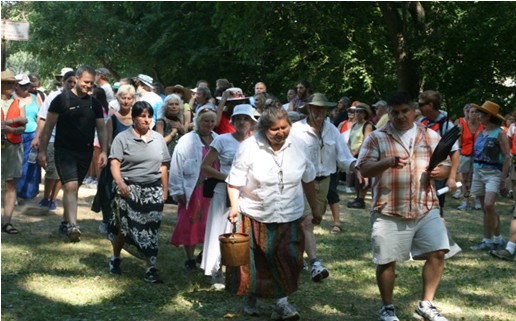Lake Monona Water Walk delivers an important message – Wednesday, July 11, 2012
The call to water and the respect First Nations Ojibwe Grandmother Josephine Mandamin has toward water is something she takes very seriously.

Grandmother Josephine Mandamin (center) leads the walk around Lake Monona on Sunday, July 8. She blessed the waters of the lake and carried a bucket of lake water the entire distance around the lake as part of the water walk traditions.
It’s what drove her to walk all five Great Lakes and, on Sunday, July 8, she felt the calling again, walking around Lake Monona. Before Sunday’s journey around Lake Monona, Grandmother Josephine emphasized the importance of water preservation during a ceremony on Friday at Winnequah Park that kicked off the three-day Lake Monona Water Walk celebration.
“I’ve been called here to respect her, to pray for her, to sing for her, give thanks to her,” Grandmother Josephine said, referring to Lake Monona. “Respect her in all that she is.”
As she addressed a captivated audience, Grandmother Josephine questioned how future generations would be able to afford water. She referred to bottled water as “dead water,” saying, “if I wrapped you in plastic, how long do you thinkyou would last?”
In the bodies of water that she’s walked around, Grandmother Josephine has tried to raise awareness about water preservation.
“If we continue with our negligence, we’re going to destroy Mother Earth, we’re going to destroy our families, we’re going to destroy the very basics of our living,” she said. “Our ancestors will be looking down with pity, with tears in their eyes.”
To preserve water, Grandmother Josephine said people must take a hard look at how they’re using water on a daily basis. She would also like to see citizens get involved by prompting their political leaders to take action. On Friday, Grandmother Josephine praised Monona Mayor Bob Miller for bringing awareness to water conservation.
Four times a year, Grandmother Josephine “sits on Mother Earth” for four days and four nights without food or water. She told the crowd at Winnequah Park if each one of them did that for even one day, they could make a difference.
“You will realize how precious that first drink of water will be for you, that first food that you eat,” she said. “And if you look at the multitude of the people that would be doing that, how much less garbage would be put out? How much less food would be wasted?”
Another speaker that ignited the crowd was William Waterway Marks, an international author and water researcher, who praised the Madison area for their awareness of environmental issues.
“When I was sophomore in college, I was investigating fish kills and industrial pollution along the rivers of New York and New Jersey … and I had my life threatened. I was chased, and many other things occurred while I was in the field collecting water samples and photographs,” Marks said. “And there, in the newspapers, were the stories in the late ’60s about Madison, Wisconsin and the DDT trials. Wisconsin had the only court system in the United States that allowed scientists and people from the universities, citizens, to give evidence against a chemical that was dangerous. It was the first time in the history of the United States and it happened in Wisconsin. It’s because of Wisconsin that DDT was banned in the United States.”
Bob Whitehorse, from a prominent family native to Monona, talked about all the activities he enjoyed as a child on the water.
“Water is such a precious thing, because there are generations that will never see it like I did,” he said. Miller and Madison Mayor Paul Soglin also gave speeches with Soglin stating, “This week renews our appreciation for water.”
Friday’s opening ceremony also featured performances from the Thundercloud Singers, a group of native drummers who’ve performed for several prominent acts such as Pearl Jam and the Dave Matthews Band. As the Thundercloud Singers performed the Young Men and Young Lady Dancers entertained the crowd with native dances.
Saturday’s events featured a lagoon walk, led by Grandmother Josephine. There were also many activities for kids, such as face painting, fishing and a water blessing. Shane Vondra, a Native American flute player, also entertained the crowd.
On Sunday, Grandmother Josephine held a sunrise ceremony and an all traditions water blessing at Frost Woods Beach in Monona. She talked about the importance of water throughout her peoples’ history. She also blessed a bucket of water she carried around Lake Monona.
In a closing statement, event organizer Dianne Aldrich said, “Grandmother Josephine came to ‘Speak to the hearts of the people’ and I felt that the hearts of the people strongly came together in support of the waters. A precious water community gathered and shared in a moment that seems beyond words. It has been a magical
journey from the beginning and thefeel of the weekend was that good medicine was being shared.
“The countless number of individuals that showed up to help, finance, labor, sing, educate, paddle, draw, bless, advocate, drum, speak, design, construct, support, pray, dance, sponsor, distribute, print, write, volunteer, vision, cook, serve, hug, provide, account, heal, babysit, believe, paint, watch, cheer, listen, fish, learn, set up, break down, explain, eat, walk and share their love for and understanding of water is a vision of beauty and power to behold,” Aldrich continued. “I want to say THANK YOU to each and every heart who heard the call of the water. In the Ojibway language; Miigwech (thank you) to All. Miigwech to the Waters. Miigwech to Life. Aho.”
by Kevin Damask(Herald-Independent Reporter)
Courtesy of The Herald-Independent
